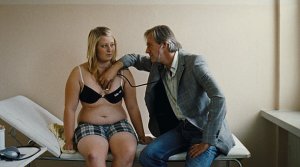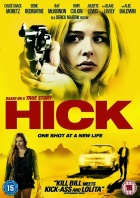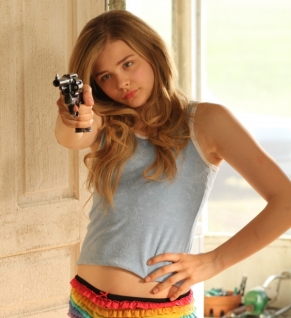
Raging hormones. Sexual frustration. Adolescent rebellion. A lot can go on during a summer at fat camp.
Cute, heavyset 13-year-old Melanie (Melanie Lenz) is dropped off at a weight management camp by her Aunt (Maria Hofstatter) when her mother goes off on vacation to Kenya. Not as bitter as you might expect, Melanie quickly makes friends with a more sexually experienced girl (Verena Lehbauer) and develops a heart-stopping crush on the camp’s middle-aged physician (Joseph Lorenz,) who is unnervingly receptive to her girlish flirtations.
“Paradise: Love” is the third in a trilogy, Ulrich Seidl’s thematic follow-up to “Paradise: Love,” focusing on Melanie’s horny sex tourist mother, and “Paradise: Faith,” following the daily life of the religious fanatic aunt (portrayed briefly in this film) who takes her love for Jesus into the realm of obsession. We fear for Melanie watching “Paradise: Hope.” Desperately hoping that she will not get over her head pining for this older man.
Never during the conversations between the fat camp teens do we get the impression that they are acting. They talk, look, and feel like real people- making themselves out to be more experienced then they are, discussing past escapades with a knowing air, playing spin the bottle giddily while drunk on cheap beer.
This is a movie that understands teen angst and desire and the mad contrast in the level of experience and sexual maturity of adolescent kids (while Melanie’s friend plays the part of an adult, wise in the ways of men, another camp girl still walks around clad in a pink Hello Kitty shirt and many of the kids remain hopelessly naive.)
The teens alternately understand a lot and see a lot more than the adults give them credit for and don’t know a damn thing- about love, about relationships, about the forbidden power a child can have over an adult. Melanie craves tenderness. She wants to feel loved and desired by this aging but virile man. Her instructor’s desire is less emotional, more carnal.
A bit of a dirty old man, he finds attentions from a virginal thirteen-year-old almost to much too resist. The viewer desperately watches events unfold, afraid for Melanie’s sexual and emotional health. Will the object of her affections play the part of a classic predator, everything your mother ever warned you about… or a blessing in disguise?
An almost complete lack of music reigns over this dark but tremulously hopeful story. There’s lots of shots of the teens trying to get into shape while their instructor (Michael Thomas) sternly guides them, eating low fat food in the dining hall, and chatting in their dorms, with few intimate close-up’s, giving an almost fly-on-the-wall feeling to the film. The performances are naturalistic and restrained, showing burgeoning promise in Melanie Lenz.
I wish people online would stop describing Melanie’s character as trying to ‘seduce’ her pediatrician. That man was sending Melanie signals loud and clear, in a playful but totally inappropriate way. Look at the scene where the man follows her hungrily into the woods, looming threateningly in the frame, predatory even as she casts looks upon him beseeching him to follow her. Melanie’s girlish ignorance of the consequences of her crush remain abundantly clear despite her pursuit of the much older man.
Melanie is a kid, for all intents and purposes, albeit a curvy, physically mature one. As far as I’m concerned this is a movie about a flirtation that wouldn’t have gone nearly so far had the adult acted in a grown-up way and gently rebuffed the child from the get-go.
The only thing I wasn’t sure about in this film was the ending. It seemed to end a bit too cryptically, even by European art film standards and I wasn’t wild about the strange and slightly creepy way it went down. Somehow a story revolving around sexual tension between an adult and a child manages to avoid being gross and exploitative- until that scene in the bar. It’s one of those films where you ask, is the hero-slash-heroine going to be okay?- and in this case you just don’t know.
Though slightly less dark than “Paradise: Faith” (I watched the trilogy all out of order, leaving the first installment for last,) “Paradise: Hope” has it’s share of uncomfortable moments and taboo subject matter. For the most part, though, it establishes director Seidl as less of a creepy old man with a camera and more as an observer of life- the discomforting parts, the parts maybe not everybody can talk about, even the ugly parts- to not sordid, but spectacularly real effect. It’s a story that couldn’t have been told in America, and are you really going to fault it there? Controversial, but more palpable that you might think considering the subject matter.













